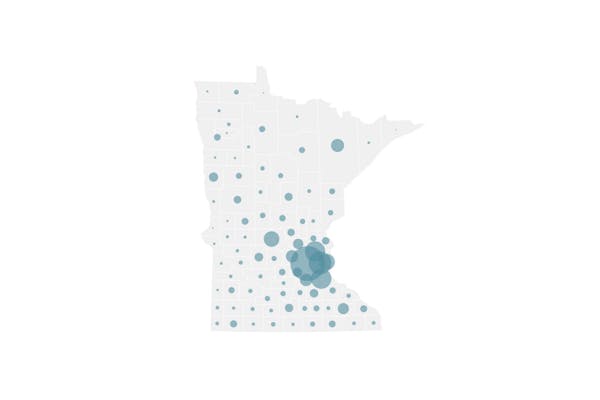It's 4 a.m. in southern Minnesota and infectious disease physician Priya Sampathkumar has yet to go to bed.
While others sleep, the Mayo doctor works into the wee hours from her Rochester home, making phone calls in a frantic search for hospital beds half a world away and for much-needed oxygen for patients she's never met.
As the deadly coronavirus overwhelms her native India, Sampathkumar and her colleagues are fielding desperate calls from family, friends and friends of friends back home who have nowhere else to turn for help as COVID-19 cases surge there.
"The sheer numbers are overwhelming," Sampathkumar said Thursday. "There are more than 350,000 cases a day and it's likely 10 times that because the information coming out of the country is unreliable. Testing is hard to come by because so many are sick."
The devastating toll is documented daily in news reports — hospitals are swamped, oxygen supplies are dwindling and sick people are dying as they wait to be seen by doctors.
"I can't imagine what the images are like on TV because I'm hearing the pain in people's voices," Sampathkumar said.
Personally, she and her husband, Dr. Vincent Rajkumar, who also works at Mayo, feel fortunate because their families live in the southern part of India and have been isolated from the worst of the virus spread.
"We imposed a lockdown on them from here," Sampathkumar said.
That meant watching a grandchild's wedding via Zoom and giving permission to go out of the house only for a vaccine, she added.
But others have been less fortunate.
A colleague's mother desperately needed a hospital bed in India, so Sampathkumar and her Minnesota colleagues called until they found one. Soon after, the hospital where the woman was being treated tweeted that the facility had one more hour of oxygen left.
"She's one of 50 patients in a small hospital and they all need oxygen," Sampathkumar said.
The Minnesota doctors rallied again, reaching a friend who runs a hospital in India that could provide a cylinder of oxygen.
The situation is so grim that oftentimes doctors and families in Minnesota, more than 7,000 miles away, are the last hope for help.
"The patient is gasping for breath so who is going to make these calls?" Sampathkumar said.
Loved ones in India often are too sick with COVID-19 to lend support. Doctors and nurses are working 24/7 and many are falling ill as well, Sampathkumar added.
"It's unimaginable," she said.
For now, Sampathkumar has been so preoccupied by trying to help that she hasn't had time to feel the deep sorrow. Over the past five days, she's immersed herself in a global volunteer group — India Covid SOS. People from all walks of life, such as health care workers, scientists, policymakers and logistics experts, have joined forces to raise money, collect supplies, create protocols and answer the needs of those on the ground in India, Sampathkumar said.
"I feel like we're helping but the need is so enormous that so much more has to be done, including help from the U.S. government," she said.
While the number of COVID-19 cases reported in the United States decreases as more people get vaccinated, the virus surge in India and neighboring countries can't be ignored, Sampathkumar said.
"Unless the U.S. wants to close its borders for a year, this is everybody's problem," she said. "If we don't help all these countries that are seeing surges, we're going to have our own fourth and fifth waves and it's never going to end."
Organizations in Minnesota and around the globe, such as the Hindu Society of Minnesota, which recently started raising money for COVID-19 relief efforts in India, are rallying.
The number of Minnesota residents with Asian Indian ancestry has increased from 30,500 in 2010 to 40,500 in 2019, making them the second largest Asian group after Hmong, according to the state demographer's office.
For many, what's playing out in India is taking a personal toll.
"In the last three weeks, I had four close relatives die," said Gokul Upadhyay, manager for the Hindu Society of Minnesota.
"The number of virus cases in India seemed to be falling earlier this year," he said. "Everyone in India was thinking everything would be OK by May or June. … And then it escalated."
Minnesota neurologist Dr. Rajiv Aggarwal can hear the fear in his parents' voices when he calls them.
"They're vaccinated but they're shaken by what they're seeing," he said.
Like others in Minnesota, Aggarwal, president of the Chance Foundation, is springing into action. His organization has raised $51,000 since last week and hopes to raise even more to help open hospitals in India.
Meanwhile, the India Association of Minnesota also is urging members of Minnesota's congressional delegation to advocate for more U.S. aid to India and coordinating fundraising for some of its partner organizations.
If not for these relief efforts, Kiran Bandi, the association's president, would feel a sense of helplessness being so far from his homeland.
"I'm scared," he said. "I wish and hope that India will come through this soon."
Mary Lynn Smith • 612-673-4788
New Minnesota GOP leaders seek peace with party's anti-establishment wing

Who is Republican Lisa Demuth, Minnesota's first House speaker of color?

Minnesota House GOP, Secretary of State Steve Simon return to Supreme Court
Supreme Court sides with DFL and Simon, says 68 House members needed for floor action

